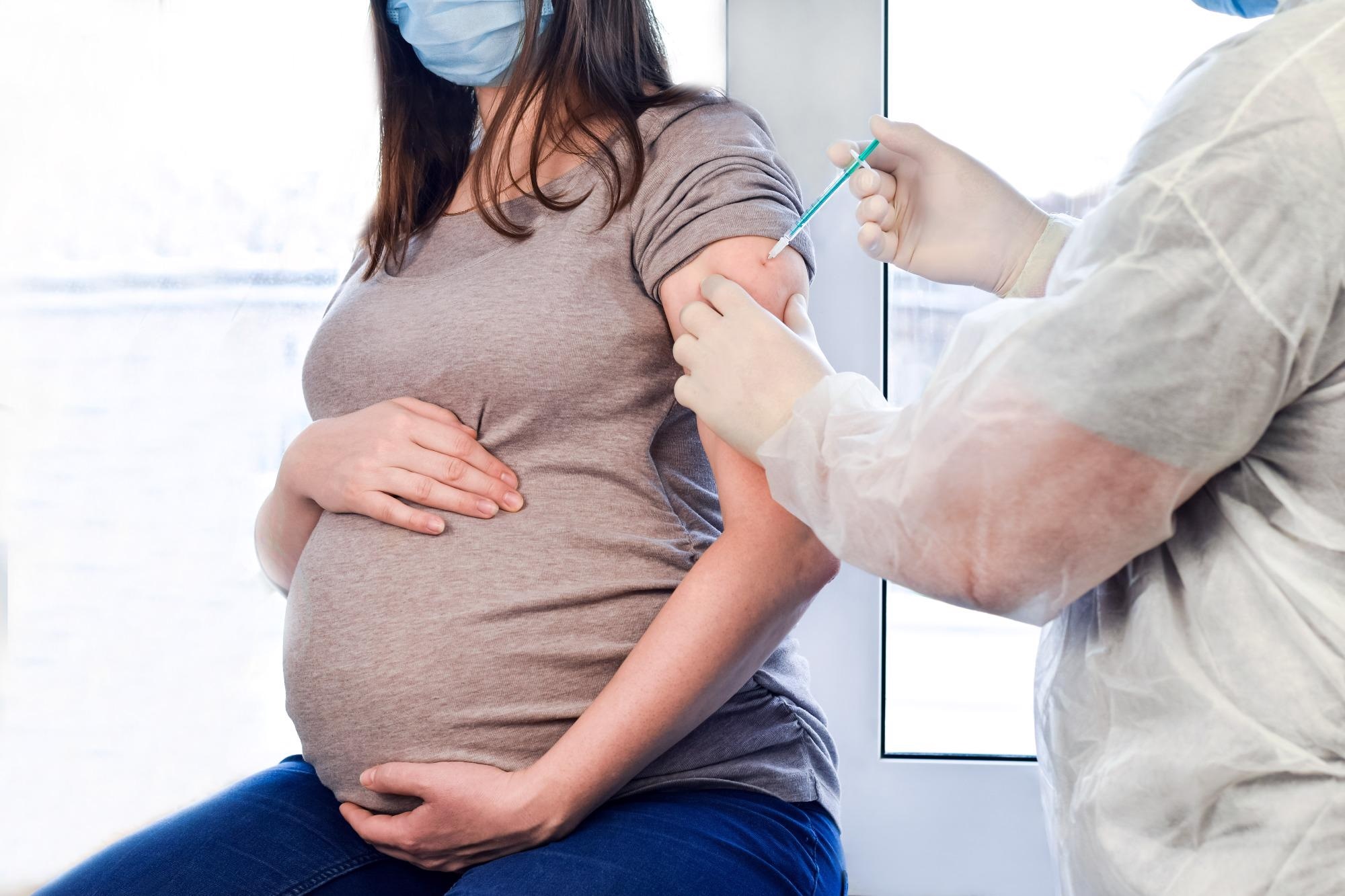A new retrospective cohort study conducted across a large population of pregnant women in Ontario, Canada, has confirmed that the coronavirus disease 2019 (COVID-19) vaccination administered during pregnancy is not associated with any increased risk of adverse maternal or neonatal peripartum outcomes.
The findings remained unchanged when the data were stratified according to the number of doses received during pregnancy, vaccine manufacturer, or the trimester (second or third) when dose-1 was received.
 Investigation: Association of COVID-19 Vaccination in Pregnancy With Adverse Peripartum Outcomes. Image Credit: Marina Demidiuk / Shutterstock
Investigation: Association of COVID-19 Vaccination in Pregnancy With Adverse Peripartum Outcomes. Image Credit: Marina Demidiuk / Shutterstock
Pregnancy and COVID-19
Women carrying pregnancy are at increased risk of COVID-19 related complications such as hospitalizations, intensive care units (ICU) admissions, and increased mortality risk. In addition, adverse pregnancy outcomes, such as premature births and stillbirths, have also been observed after severe acute respiratory syndrome coronavirus 2 (SARS-CoV-2) infection.
Like influenza and pertussis vaccines, which are routinely administered during pregnancy to protect both mother and newborns, many countries now recommend the COVID-19 vaccines during pregnancy. However, the relative lack of prelicensure safety data in pregnant women necessitates the need for more SARS-CoV-2 vaccine safety studies in this population to rule out any potential risks of adverse maternal or neonatal outcomes.
Previous studies indicate that COVID-19 vaccination during pregnancy is not associated with increased risks of spontaneous abortion, premature birth, or small-for-gestational-age birth. However, the evidence on other mother and newborn-related outcomes from large populations is still lacking.
The Study
The team evaluated maternal and neonatal peripartum outcomes, occurring just before, during, or after delivery, which could be associated with COVID-19 vaccination during pregnancy. Maternal outcomes included postpartum hemorrhage, chorioamnionitis, cesarean delivery, and emergency cesarean delivery, and newborn outcomes included neonatal ICU (NICU) admission and low newborn 5-minute Apgar score (<7).
This population-based retrospective cohort study was based on the pregnancy record data collected from Ontario (Canada) birth registry linked with the provincial COVID-19 immunization database. COVID-19 vaccination program began on December 14, 2020, in Ontario. Therefore, all pregnancy records with a birth date or expected due date on or after December 14, 2020, were probed until the end of the study period (September 30, 2021).
Linear and robust Poisson regression was used to analyze adjusted Risk Differences (aRDs) and adjusted Risk Ratios (aRRs) respectively, comparing cumulative incidence (CI) of outcomes in those who received COVID-19 vaccination during pregnancy with those vaccinated after pregnancy (comparison group-1) and those with no COVID-19 vaccination during or after pregnancy by September 30, 2021 (comparison group-2). Inverse probability of treatment weights was used to adjust for confounding factors.
Findings
Among 97,590 pregnant individuals from Ontario who met the study’s inclusion criteria, 23% (n=22,660) received at least one dose of COVID-19 vaccine during pregnancy and 77% (n=74,930) had not been vaccinated by delivery (46%/n=44,815 underwent after pregnancy [comparison group-1] and 31%/n=30,115 were not vaccinated by the end of study period [comparison group-2]).
Of the 22,660 individuals vaccinated during pregnancy, 3.4% received only dose 1; 48.3% received dose-1 during pregnancy and dose-2 after pregnancy; and 48.3% received both doses during pregnancy. Notably, 99.8% of pregnant individuals received an mRNA vaccine.
Compared with group-1, who received the COVID-19 vaccine after pregnancy, the team did not find any significant association between COVID-19 vaccination during pregnancy and postpartum hemorrhage. The cumulative incidence (CI) of postpartum hemorrhage in both groups was 3.0%, the aRR was 0.91 (95% CI, 0.82- 1.02), and the adjusted RD was −0.28 per 100 individuals (95% CI, −0.59 to 0.03).
Furthermore, COVID-19 vaccination during pregnancy (in comparison to group-1) was also not significantly associated with any increased risk of chorioamnionitis, cesarean delivery, NICU admissions, or Apgar score.
Compared with the group-2 individuals, who were never vaccinated, findings were qualitatively similar with no significantly increased risks of any of the outcomes in those vaccinated during pregnancy.
The results from sensitivity analyses, designed to account for potential confounding factors such as maternal age, calendar time, time since vaccination, gestational length, and COVID-19 during pregnancy, also did not vary from the original results.
“COVID-19 vaccination during pregnancy, compared with vaccination after pregnancy and with no vaccination, was not significantly associated with increased risk of adverse peripartum outcomes”, concludes the team.
The team further cautions to interpret the study with the consideration that the vaccinations received during pregnancy were primarily mRNA vaccines administered in the second and third trimesters.